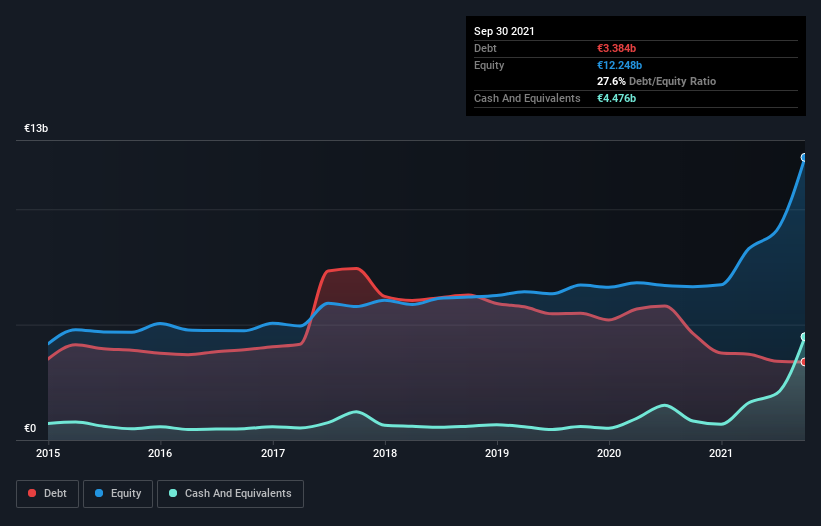David Iben put it well when he said, 'Volatility is not a risk we care about. What we care about is avoiding the permanent loss of capital.' It's only natural to consider a company's balance sheet when you examine how risky it is, since debt is often involved when a business collapses. Importantly, Hapag-Lloyd Aktiengesellschaft (ETR:HLAG) does carry debt. But the more important question is: how much risk is that debt creating?
What Risk Does Debt Bring?
Generally speaking, debt only becomes a real problem when a company can't easily pay it off, either by raising capital or with its own cash flow. If things get really bad, the lenders can take control of the business. However, a more common (but still painful) scenario is that it has to raise new equity capital at a low price, thus permanently diluting shareholders. Of course, the upside of debt is that it often represents cheap capital, especially when it replaces dilution in a company with the ability to reinvest at high rates of return. When we think about a company's use of debt, we first look at cash and debt together.
Check out our latest analysis for Hapag-Lloyd
What Is Hapag-Lloyd's Debt?
You can click the graphic below for the historical numbers, but it shows that Hapag-Lloyd had €3.38b of debt in September 2021, down from €4.62b, one year before. But it also has €4.48b in cash to offset that, meaning it has €1.09b net cash.

How Healthy Is Hapag-Lloyd's Balance Sheet?
According to the last reported balance sheet, Hapag-Lloyd had liabilities of €5.32b due within 12 months, and liabilities of €4.76b due beyond 12 months. On the other hand, it had cash of €4.48b and €3.11b worth of receivables due within a year. So it has liabilities totalling €2.48b more than its cash and near-term receivables, combined.
Since publicly traded Hapag-Lloyd shares are worth a very impressive total of €38.8b, it seems unlikely that this level of liabilities would be a major threat. However, we do think it is worth keeping an eye on its balance sheet strength, as it may change over time. While it does have liabilities worth noting, Hapag-Lloyd also has more cash than debt, so we're pretty confident it can manage its debt safely.
Even more impressive was the fact that Hapag-Lloyd grew its EBIT by 536% over twelve months. That boost will make it even easier to pay down debt going forward. There's no doubt that we learn most about debt from the balance sheet. But it is future earnings, more than anything, that will determine Hapag-Lloyd's ability to maintain a healthy balance sheet going forward. So if you're focused on the future you can check out this free report showing analyst profit forecasts.
But our final consideration is also important, because a company cannot pay debt with paper profits; it needs cold hard cash. Hapag-Lloyd may have net cash on the balance sheet, but it is still interesting to look at how well the business converts its earnings before interest and tax (EBIT) to free cash flow, because that will influence both its need for, and its capacity to manage debt. Over the last three years, Hapag-Lloyd actually produced more free cash flow than EBIT. That sort of strong cash generation warms our hearts like a puppy in a bumblebee suit.
Summing up
We could understand if investors are concerned about Hapag-Lloyd's liabilities, but we can be reassured by the fact it has has net cash of €1.09b. And it impressed us with free cash flow of €6.3b, being 121% of its EBIT. So we don't think Hapag-Lloyd's use of debt is risky. When analysing debt levels, the balance sheet is the obvious place to start. But ultimately, every company can contain risks that exist outside of the balance sheet. Case in point: We've spotted 2 warning signs for Hapag-Lloyd you should be aware of, and 1 of them can't be ignored.
Of course, if you're the type of investor who prefers buying stocks without the burden of debt, then don't hesitate to discover our exclusive list of net cash growth stocks, today.
Valuation is complex, but we're here to simplify it.
Discover if Hapag-Lloyd might be undervalued or overvalued with our detailed analysis, featuring fair value estimates, potential risks, dividends, insider trades, and its financial condition.
Access Free AnalysisHave feedback on this article? Concerned about the content? Get in touch with us directly. Alternatively, email editorial-team (at) simplywallst.com.
This article by Simply Wall St is general in nature. We provide commentary based on historical data and analyst forecasts only using an unbiased methodology and our articles are not intended to be financial advice. It does not constitute a recommendation to buy or sell any stock, and does not take account of your objectives, or your financial situation. We aim to bring you long-term focused analysis driven by fundamental data. Note that our analysis may not factor in the latest price-sensitive company announcements or qualitative material. Simply Wall St has no position in any stocks mentioned.
About XTRA:HLAG
Flawless balance sheet with proven track record and pays a dividend.
Similar Companies
Market Insights
Community Narratives





